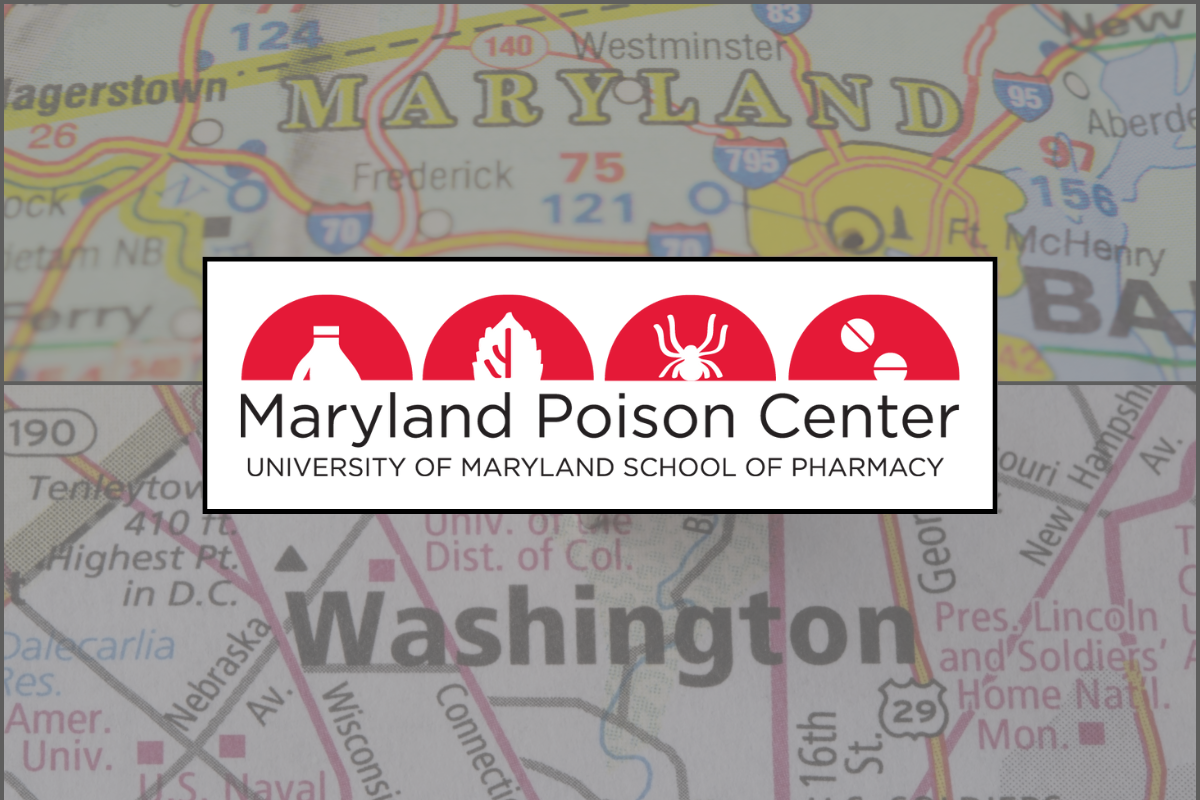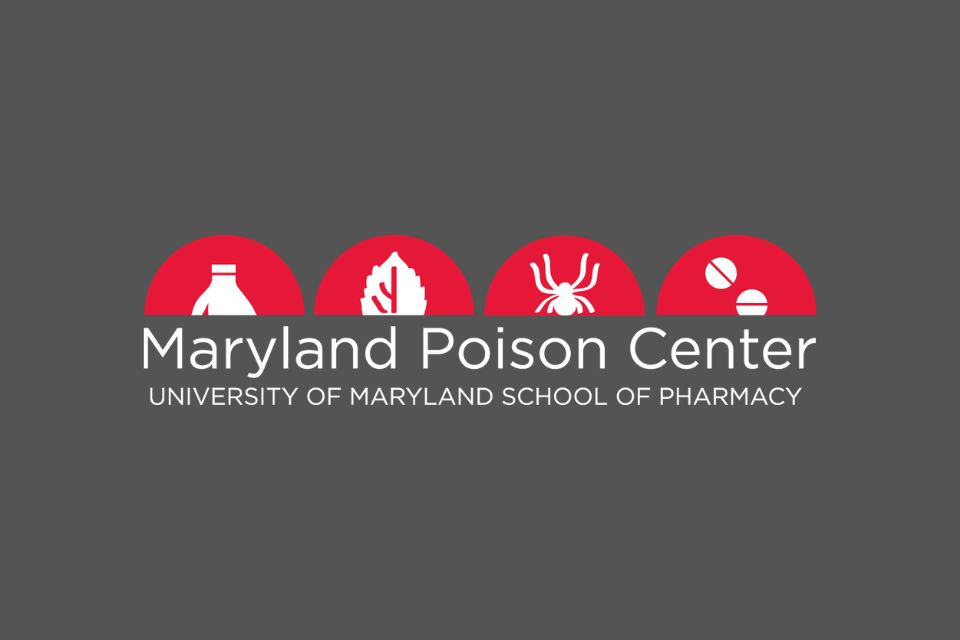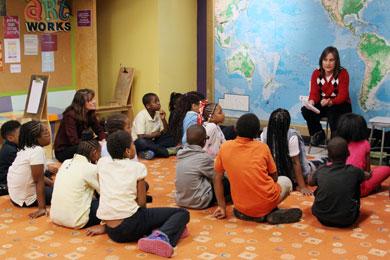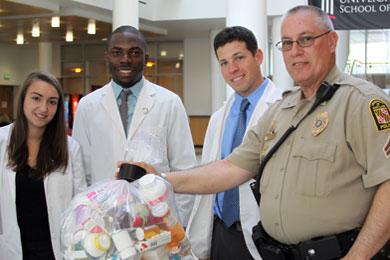Maryland Poison Center Expanding Service Area
Expansion will enhance public health and communication across Maryland and District of Columbia.

By Pam Carder and Emily Paterson, MS
April 1, 2025
Beginning April 1, the Maryland Poison Center (MPC), a key service of the University of Maryland School of Pharmacy (UMSOP), will extend its coverage to encompass all 23 Maryland counties, Baltimore City, and the District of Columbia. Previously, Prince George’s and Montgomery Counties, along with the District of Columbia, were serviced by the National Capital Poison Center. This expansion represents a significant milestone in the delivery of comprehensive poison control services and is being led by the Maryland Department of Health and DC Health.
“The Maryland Department of Health is proud to support UMSOP’s expansion of Maryland Poison Center services to every jurisdiction in our state,” said Nilesh Kalyanaraman, MD, deputy secretary for public health services at the Maryland Department of Health. “This expanded coverage will give Marylanders closer proximity to poison control education and event reporting and help eliminate gaps in state, local, and regional incident response preparedness.”
Ayanna Bennett, MD, MSPH, FAAP, director of DC Health, emphasized the importance of accessible emergency resources, stating, “We remain committed to ensuring all residents have access to life-saving resources and expert guidance when faced with a poisoning emergency. This expansion marks a vital step in strengthening regional public health services, improving response times, and enhancing collaboration across jurisdictions. We look forward to working alongside the Maryland Poison Center to continue protecting and educating our communities.”
Since 1972, the MPC has served as an essential resource, providing 24/7 expert guidance to Marylanders through the helpline, 1-800-222-1222. Callers receive immediate assistance from experienced health care professionals—including pharmacists, nurses, and medical experts with a combined 250 years of experience at the Maryland Poison Center —helping to address poisoning emergencies and provide critical information on treatment and prevention.
With this expansion, the MPC will not only increase its geographic coverage but also will streamline data collection and health care communication across the region. The reorganization of services will ensure that health care providers can access up-to-date, reliable information, fostering new opportunities for collaboration and response to poisoning incidents.
“We are thrilled to bring the talents of our extremely dedicated staff to Prince George’s and Montgomery Counties and the District of Columbia,” said Angel Bivens, BS Pharm, MBA, CSPI, managing director of the Maryland Poison Center. “Whether it’s our pharmacists and nurses providing expert and compassionate care to callers or our public educator creating programs and materials to provide awareness and poison safety tips, our new communities are in good hands. ”
“Maryland emergency medical service clinicians in EMS, EDs and primary care across Maryland have relied on the Maryland Poison Center for just in time, evidence based clinical guidance when a poison exposure has occurred,” said Cyndy Wright-Johnson, MSN, director of EMS for Children at Maryland Institute for Emergency Medical Services Systems. “Having immediate access to experienced health care professionals in poisoning situations is a crucial part of providing the best care to our communities. The expansion to include Montgomery and Prince George’s counties in the population of citizens, visitors, and clinicians served by the same Maryland Poison Center will enhance the support in emergencies and increase the distribution of poison prevention educational materials.”
Sarah L.J. Michel, PhD, dean of the School of Pharmacy and professor of pharmaceutical sciences, emphasized the significance of this expansion. “This is an exciting development for public health throughout the region,” says Michel. “Expanding our service coverage area will ensure that every community member will have access to the expertise and resources of the Maryland Poison Center. This step forward in integration will streamline communications and improve the efficiency of the entire system, benefiting all residents.”
In addition to the 1-800 help line, the MPC is utilizing a digital companion tool, PoisonHelp.org, to provide individuals with valuable information on poisons, symptoms, and treatments. This user-friendly online resource complements the center’s phone services, allowing the public to quickly access trustworthy information on the internet at any time.
This regional expansion will enhance the MPC’s ability to respond to poisoning emergencies, improve public health outcomes, and ensure that critical data is available to health care providers and emergency responders when needed most. “We are excited to provide a coordinated, regional approach to poisoning management and education,” said Josh King, MD, FACMT, FAACT, medical director of the Maryland Poison Center. “Our goal is for this change to be completely seamless for all residents of Maryland and the District of Columbia, with access to the same expert care in times of need. This change also offers opportunities to use consolidated data to improve our services to the public and health care professionals alike.”
The MPC encourages anyone with a poison emergency to call 1-800-222-1222, available 24/7 and free of charge. In addition, residents are invited to explore PoisonHelp.org for immediate, reliable information on poison-related issues.
With this expansion, the MPC is poised to provide expert, timely assistance to all residents in Maryland and D.C. Whether for emergency treatment advice, prevention tips, or educational information, the MPC is ready to serve the public and ensure the safety and health of communities in the region.



